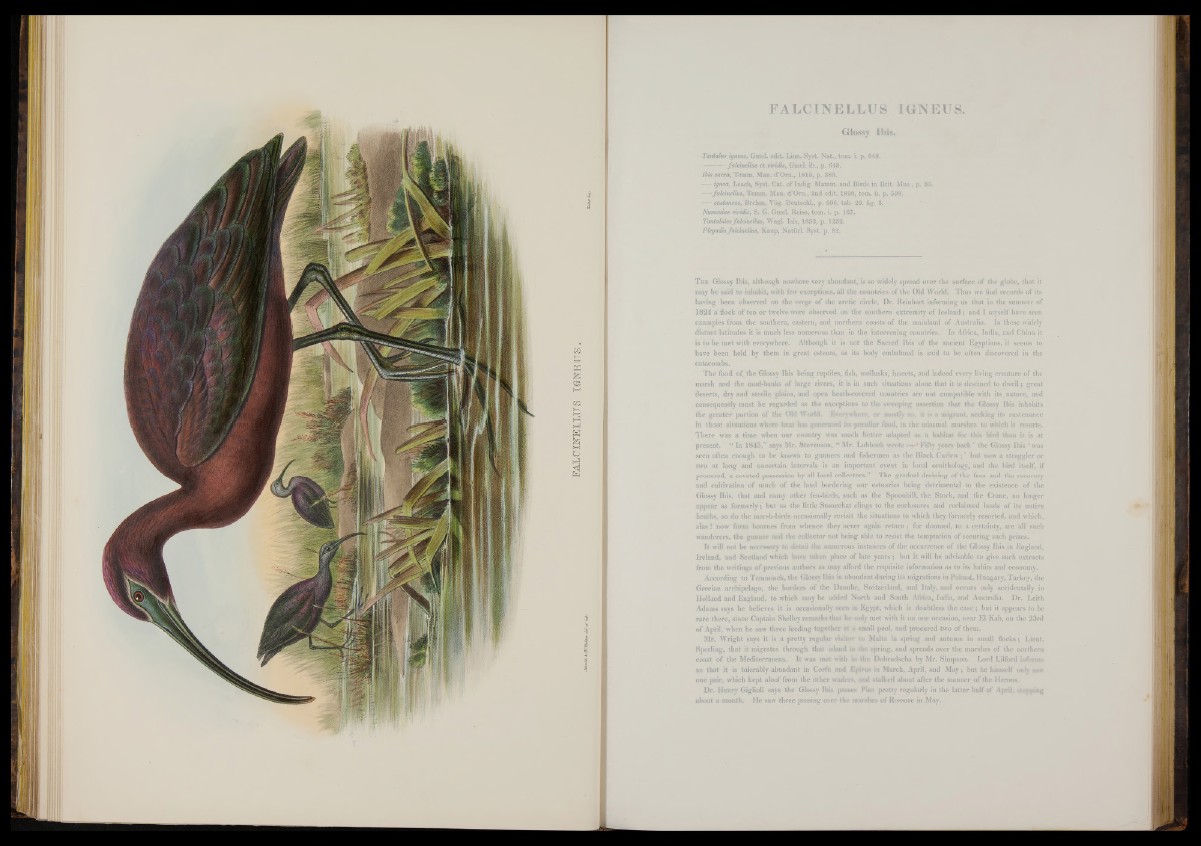
FALCINELLUS IGNEUS .
Glossy Ibis.
Tantalus igneus, Gmel. edit. Linn. Syst. N e t, tom. i. p. 649.
falcinellus et viridis, Gmel. ib., p. 648.'
Ibis sacra, Temm. Man. d’Ora., 1815, p. 385.
— ignea, Leach, Syst. Cat. of Indig. Maram. and Birds in Brit. Mus-, p. 33.
— falcinellus, Temm. Man. d’Om., 2nd edit. 1820, tom. ii. p. 598.
— castaneus, Brehm, Vög. Deutschl., p. 606, tab. 29. fig. 8.
Numenius viridis, S. G. Gmel. Reise, tom. i. p. 167.
Tantalides falcinellus, Wagl. Isis, 1832, p. 1232.
Plegadis falcinellus, Kaup, Natürl. Syst. p. 82.
T he Glossy Ibis, although nowhere very abundant, is so widely spread over the surface o f the globe, that it
may be said to inhabit, with few exceptions, all the countries of the Old World. Thus we find records of its
having been observed on the verge o f the arctic circle, Dr. Reinhart informing us that in the summer of
1824 a flock o f ten or twelve were observed on the southern extremity of Iceland ; and I myself have seen
examples from the southern, eastern, and northern coasts o f the mainland of Australia. In these widely
distant latitudes it is much less numerous than in the intervening countries. In Africa, India, and China it
is to be met with everywhere. Although it is not the Sacred Ibis of the ancient Egyptians, it seems to
have been held by them in great esteem, as its body embalmed is said to be often discovered in the
catacombs.
The food of. the Glossy Ibis being reptiles, fish, roollusks, i,nsecfs, and indeed every living creature o f the
marsh and the mud-banks of large rivers, it is in such situations alone that it is destined to dwell; great
deserts, dry and sterile plains, and open heath-covered countries are not compatible with its nature, and
consequently must be regarded as the exceptions to the sweeping assertion that the Glossy Ibis inhabits
the greater portion o f the Old World, Everywhere, or mostly so, it is a migrant, seeking its sustenance
in those situations where heat t e generated its peculiar food, in the miasmal marshes to which it resorts.
There was a time when our country was much b e tte r adapted as a habitat for this bird than it is at
present. “ In 1845,” says Mr. Stevenson, “ M r. Lubbock wrote :-r-‘ Fifty years back ’ the Glossy Ibis ‘ was
seen often enough to be known to gunners and fishermen as the Black Curlew; ’ but now a straggler or
two at long and uncertain intervals is an important event in local ornithology, and the bird itself, if
procured, a coveted possession by all local collectors.” The gradual draining o f the fens and the recovery
and cultivation o f much of the land bordering our estuaries being detrimental to the existence o f the
Glossy Ibis, that and many other fen-birds, such as the Spoonbill, the Stork, and the Crane, no longer
appear as formerly; but as the little Stonechat clings to the enclosures and reclaimed lands o f its native
heaths, so do the marsh-birds occasionally revisit the situations to which they formerly resorted, and which,
a la s ! now form bournes from whence they never again re tu rn ; for doomed, to a certainty, are all such
wanderers, the gunner and the collector not being able to resist the temptation of securing such prizes.
I t will not be necessary to detail the numerous instances o f the occurrence o f the Glossy Ibis in England,
Ireland, and Scotland which have taken place o f late years ; but it will be advisable to give such extracts
from the writings o f previous authors as may afford the requisite information as to its habits and economy.
According to Temminck, the Glossy Ibis is abundant during its migrations in Poland, H uugary, Turkey, the
Grecian archipelago, the borders o f the Danube, Switzerland, and Italy, and occurs only accidentally in
Holland and England, to which may be added North and South Africa, India, and Australia. Dr. Leith
Adams says he believes it is occasionally see« in Egypt, which is doubtless the case ; but it appears to be
rare there, since Captain Shelley remarks that be only met with it on one occasion, near El Kab, on the 23rd
o f April, when he saw three feeding together at small pool, and procured two o f them.
Mr. Wright says it is a pretty regular visitor to Malta in spring and autumn in small flocks; Lieut.
Sperling, that it migrates through that island in the spring, and spreads over the marshes o f the northern
coast o f the Mediterranean. I t was met with i« t&e Dobrudscha by Mr. Simpson. Lord Lilford informs
us that it is tolerably abundant in Corfu and Epirus in March, April, and M ay ; but be himself only saw
one pair, which kept aloof from the Other waders, and stalked about after the manner o f the Herons.
Dr. Henry Giglioli says the Glossy Ibis passes Pisa pretty regularly in the latter half of April, .stofiping
about a month. He saw three passing over the marshes of Rossore in May.